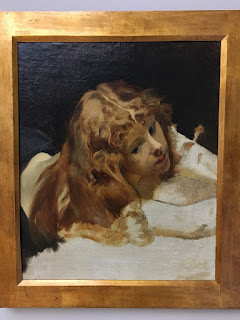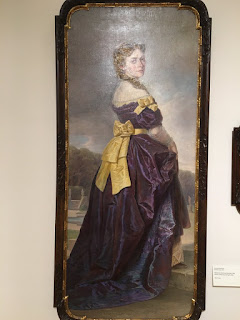It was interesting, even though I did not know any artists or their work, to experience a kind of familiarity. The walk through the National Gallery in Ljubljana is logically structured beginning from the 12th to 20th century. The story paintings tell are not that different from similar galleries in other cities and countries. And as always, I really started to get invested in paintings from the 18th century onward. Maybe because the images string more of a relation to my experiences, my way of thinking. Definitely, because the work gets looser.
Studies in oil, unfinished work, sketches mostly drew my attention. Examples show the way the artist worked, how they started and structured the painting:
 |
| Jurij Subic, 1885 Sketches for the Ceiling of the Grand Staircase of the National Museum of Slovenia |
 |
| Loved the work on the hair |
 |
| Ferdo Vesel, 1897 |
 |
| Pre-Sketch in oil, establishing tone and color |
 |
| Effective, how the building starts with a dark underpainting and the lighter tones were added on top |
 |
| Federiko Benkovic, before 1750 The Liberation of St Peter |
 |
| Study of Light and Darks, starting with a red pencil, watercolor wash (which is probably not the greatest idea, since it takes too much effort to mix greys), getting detailed with charcoal |
 |
| Ivana Kobilca, 1886 A Dutchwoman |
Other paintings I liked for several reasons:
 |
| Matevz Langus Self Portrait (interesting lead holder) |
 |
| Anton Karinger, 1869 Painter's Wife Roza Karinger |
 |
| Detail from above The color effect is just awesome |
 |
| Detail So much facial color |
 |
| Matej Sternen, 1902 A Redhead (Looseness) |
 |
| Anton Azbe, 1888 Sitting Female Semi Nude (Loved the work on the contours, striking sharp in the face and loose and soft on the back and hair) |
Keine Kommentare:
Kommentar veröffentlichen